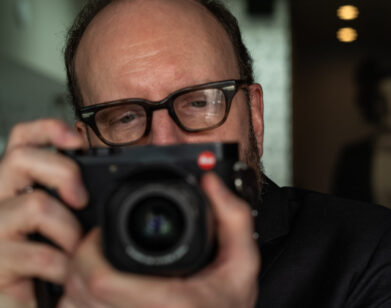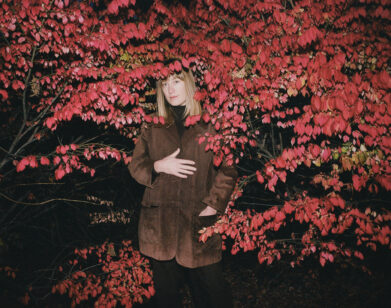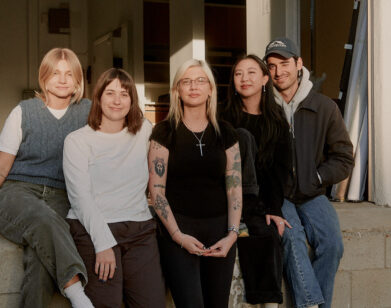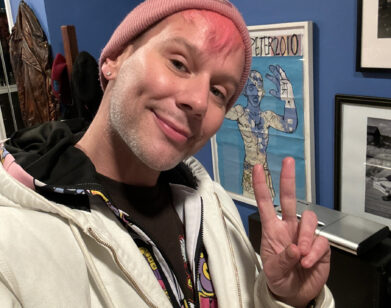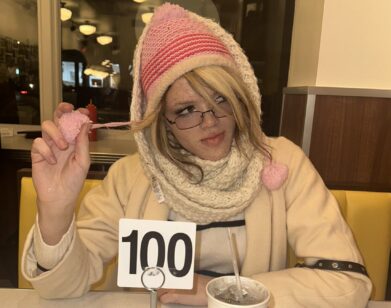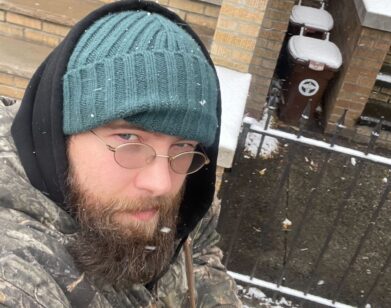Jasmine Warga’s Unromanticized Depression

ABOVE: JASMINE WARGA. PHOTO COURTESY OF THE AUTHOR.
In Jasmine Warga’s stunning debut novel, My Heart and Other Black Holes (Balzer + Bray/HarperCollins), Aysel, a 16-year-old physics enthusiast and outsider, suffers from depression and an obsession with plotting her own death. She meets Roman, a teenage boy from a neighboring town, in an online Suicide Partners forum and they team up to plot and support each other in their demise. As their suicide date nears, however, Aysel begins to wonder if her unbearable fixed heaviness is shifting, and if there could be a different kind of potential energy between Roman and herself.
Written after the loss of a close friend, Warga tackles teenage depression and isolation with empathy, honesty, and heart. Words collide like particles, transforming pain into something ultimately, redemptive.
We spoke with Warga about the alchemy of real life contributing to fiction, the magic of the Ohio River, and the physics of death and love.
SARAH HERRINGTON: I know you started this book after the death of a friend. How did this real-life occurrence translate into fiction?
JASMINE WARGA: Yes, I wrote this in the few months following the unexpected death of a very close friend. But the book isn’t in any way based on him. Instead I think my grief, my love for him and our friendship, served as inspiration. In many ways, the novel actually began with Aysel and her voice. I woke up one day hearing it. Aysel was a vessel for me to tackle questions about the demon of depression, grief, and the ultimate saving power of love and human connection.
HERRINGTON: I love how Aysel’s voice is sarcastic and honest, and then lights up in this poetic way when she talks about physics or classical music. How did her interests in science and music contribute to the language of life and death for you?
WARGA: In writing this I tried to remember my own tendencies as a teen to collect pieces of music and art that helped me better understand certain confounding things about life, death, and mortality. I spent a lot of time wondering what specific interests I would give Aysel and how those interests would shape her worldview. She has a very clinical way of looking at her life, and her interest in physics allows her to analyze through an unsentimental lens. But she’s not entirely unsentimental, even though I think she’d like the reader to believe that she is.
HERRINGTON: You end up with beautiful metaphors about unborn energy and darkness that lend themselves to Aysel’s feelings.
WARGA: Exactly. There’s a line in the book about how she reads in her physics book about how the universe begs to be observed, and that when something is observed energy can travel and transfer, change.
HERRINGTON: So when Aysel and Roman meet online the whole plan is they’ll help blot each other out. But through observing themselves and each other, and connecting, it all starts to shift.That’s such a cathartic thing to read for anyone who’s ever felt invisible or alone, which I guess is most everyone.
WARGA: [laughs] Yes, I think so.
HERRINGTON: I love the image of depression as a black slug.
WARGA: I just tried to be as honest as I could about what depression feels like, and how illogical and maddening it can be. Aysel definitely has exterior circumstances in her life that deepen her depression, like her father being in jail and how she feels like an outsider as a first-generation American. But a lot of her problems, I believe, stem from simply suffering from clinical depression. So I described depression as this black slug inside her body that sucks up any potential she has for happiness. The tricky thing for me with this book was I wanted to walk that line between making sure I was honest and truthful about depression in the hopes of bringing more awareness to mental illness and helping to de-stigmatize it, while also not romanticizing it. To me, a black slug is not a romantic image, but it’s an honest one.
HERRINGTON: That’s a good point. I didn’t read Aysel’s story with some romanticized attraction to it, to obliterating oneself, but I didn’t read it feeling pity either.
WARGA: Thank you. It’s one thing to create a character who is meant to be endearing, and it’s another to create a character who is difficult, even to you—maybe especially to me since I gave so many of my own flaws to Aysel—and hope that people will still find something worth rooting for.
HERRINGTON: In writing a teenage character did you find yourself going back to your own teen years? Did you have flashbacks to homeroom?
WARGA: [laughs] I suppose I did choose to heighten everything in Aysel’s world from my own experience as a teenager. I know what it’s like to look different from the majority your classmates, to have a last name that sets you apart, to constantly have to answer questions about your family’s heritage—but I lived in a larger suburban town as opposed to a small rural one, and thankfully my father was not in prison. I guess what I’m trying to say is I took my adolescence’s landscape and just dramatized and intensified it to create the fictional world in which the story takes place.
HERRINGTON: What is the significance (if there is any) in setting the story in Kentucky? Are you from there?
WARGA: Well, I grew up a little outside of Cincinnati, which is practically Kentucky. I find the Ohio River Valley area to be fascinating. It’s a complicated place culturally, a mix of the South and the North. I was also interested in playing with the suffocating nature of a small town juxtaposed with the Ohio River, which has historically been a landmark for freedom, as thousands of slaves escaped to the North via the river in the areas where it was narrow.
HERRINGTON: Is there anything Aysel ultimately taught you about happiness?
WARGA: She actually taught me that happiness isn’t what’s ultimately important—it’s meaningfulness. Happiness can be fleeting, but what’s important is remembering the things in our life that ground us and give us purpose. And Aysel learns a lot about self-love and self-acceptance, and those lessons were important for me to reflect on. That idea of being kinder and gentler with one’s self. I think that’s part of what the voice of Aysel brought me.
MY HEART AND OTHER BLACK HOLES COMES OUT TOMORROW, FEBRUARY 10. JASMINE WARGA WILL BE READING AT BOOKS OF WONDER ON 18 W. 18TH STREET IN NEW YORK CITY ON THURSDAY, FEBRUARY 12, 6 PM TO 8 PM.

